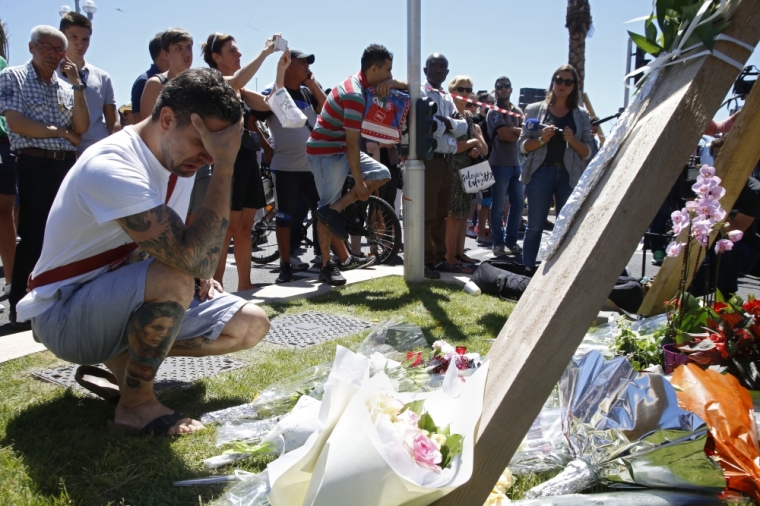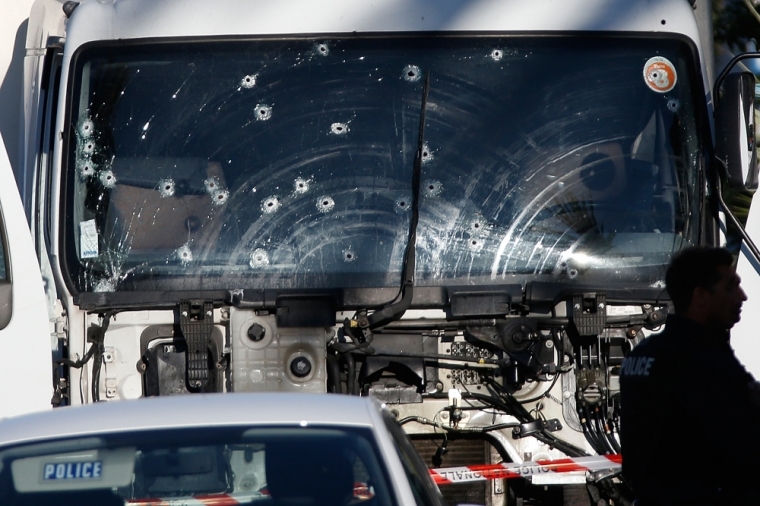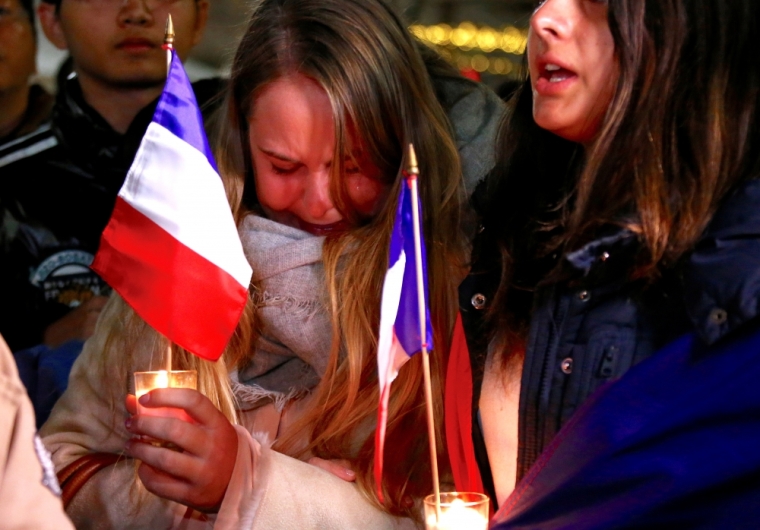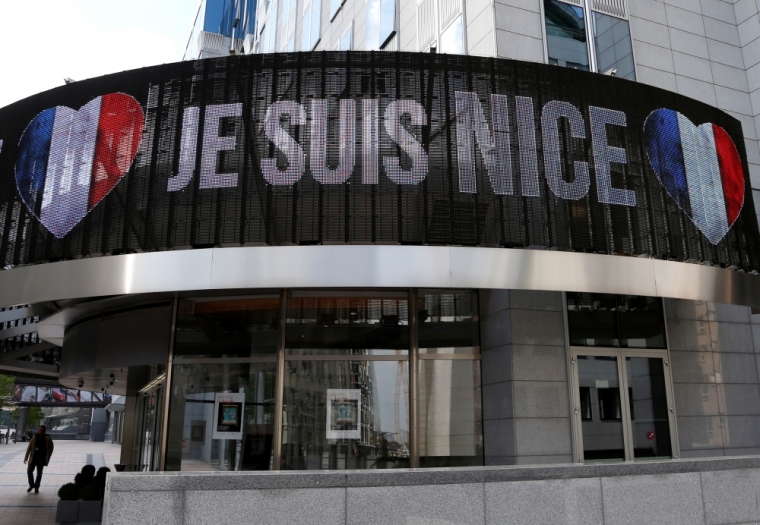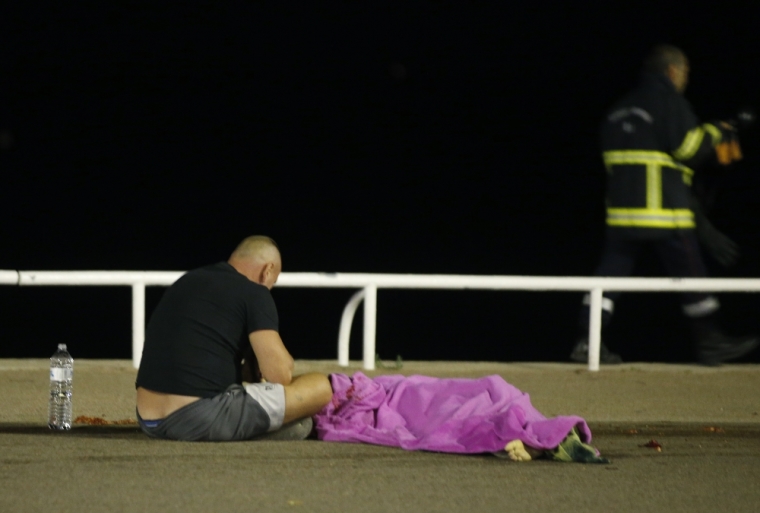Bastille Day Terror Attack: 10 Children Among 84 Killed by Attacker Mohamed Bouhlel
NICE, France — An attacker plowed a truck into crowds celebrating Bastille Day on the French Riviera, killing at least 84 people, 10 of them children, in what President Francois Hollande called a terrorist act by an enemy determined to strike all nations that share France's values.
The driver, identified by police sources as Mohamed Lahouaiej Bouhlel, a 31-year-old Tunisian resident in France, also appeared to open fire before officers shot him dead. He was known to the police in connection with common crimes such as theft and violence but was not on the watch list of French intelligence services, the sources said.
The third mass killing in Western Europe in eight months caused more fear across an already anxious continent struggling with security challenges from mass immigration, open borders and pockets of Islamist radicalism.
The truck zigzagged along the seafront Promenade des Anglais in the city of Nice as a fireworks display marking the French national day ended on Thursday night. It careered into families and friends listening to an orchestra or strolling above the beach on the Mediterranean Sea towards the grand, century-old Hotel Negresco.
Bystander Franck Sidoli said he had seen people go down. "Then the truck stopped, we were just five metres away. A woman was there, she lost her son. Her son was on the ground, bleeding," he told Reuters at the scene.
Dawn broke on Friday with pavements smeared with dried blood. Smashed children's strollers, an uneaten baguette and other debris strewn about the promenade. Small areas were screened off and what appeared to be bodies covered in blankets were visible through the gaps.
The truck was still where it had come to rest, its windscreen riddled with bullets.
"I saw this enormous white truck go past at top speed," said Suzy Wargniez, a local woman aged 65 who had watched from a cafe on the promenade. "It was shooting, shooting."
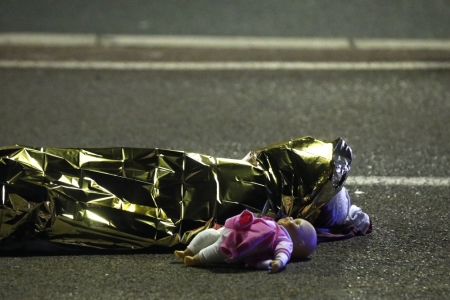
After visiting victims at Nice's Pasteur hospital, Hollande said about 50 people were still in a critical condition. The dead included many children. At least two Americans and one Russian were among those killed.
At the hospital, medical staff were treating large numbers of injuries. Waiting for friends who were being operated on was 20-year-old Fanny.
"The truck pushed me to the side. When I opened my eyes I saw faces I didn't know and started asking for help," she told Reuters. "Some of my friends were not so lucky. They are having operations as we speak."
Early indications were that the attack was the work of a lone assailant. Tunisian security sources told Reuters the suspect had last visited his hometown of Msaken, about 120 km (75 miles) south of Tunis, four years ago. He was married with three children, and was not known by the Tunisian authorities to hold radical or Islamist views.
"France is filled with sadness by this new tragedy," Hollande said in a dawn address. "There's no denying the terrorist nature of this attack."
Only hours before the attack, he had announced plans to lift a state of emergency in place since November, when Islamic State gunmen and suicide bombers struck Paris entertainment spot on a Friday evening, killing 130 people.
Bodies every 5 meters
In his address he said the state of emergency would now be extended by a further three months. He would call up military and police reservists to relieve forces worn out by enforcing it.
Nice-Matin journalist Damien Allemand had been watching the firework display when the truck tore by. After taking cover in a cafe, he wrote on his paper's website of what he saw: "Bodies every five metres, limbs ... Blood. Groans."
"The beach attendants were first on the scene. They brought water for the injured and towels, which they placed on those for whom there was no more hope."
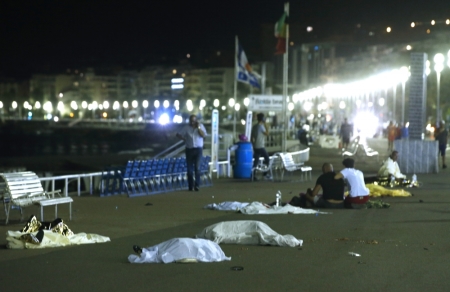
Major events in France have been guarded by troops and armed police since the Nov. 13 attacks. But those guarding the crowd on Thursday appeared unable to halt the Renault truck as it tore along pavements and a pedestrian zone. According to one city official, it had careered for up to 2 km (1.5 miles).
A local government official said weapons and grenades were later found inside the vehicle. Nice-Matin newspaper said on Twitter that police were searching the attacker's home in the Nice neighbourhood of Abattoirs.
After midday reporters were told by police to move away from a white Volvo delivery van near the home because they feared it might be holding explosives. Officers carried out a controlled explosion on the vehicle, blowing the doors open and leaving shattered glass all around, but it was not clear whether they found anything incriminating.
Nice airport was briefly evacuated as a precautionary measure after an unattended bag was found, an airport official said.
Islamic State targets France
After the Paris attacks, Islamic State said France and all nations following its path would remain at the top of its list of targets as long as they continued "their crusader campaign", referring to action against the group in Iraq and Syria.
France is a major part of a U.S.-led mission conducting air strikes and special forces operations against Islamic State, as well as training Iraqi government and Kurdish forces.
"We will further strengthen our actions in Syria and Iraq," Hollande said, calling the tragedy - on the day France marks the 1789 revolutionary storming of the Bastille prison in Paris - an attack on liberty by fanatics who despised human rights.
"We are facing a battle that will be long because facing us is an enemy that wants to continue to strike all people and all countries that have values like ours," he said.
France has also sent troops to west Africa to keep Islamist insurgents at bay.
The country is home to the European Union's biggest Muslim population, mostly descended from immigrants from North African former colonies. It maintains a secular culture that allows no place for religion in schools and civic life, which supporters say encourages a common French identity but critics say contributes to alienation in some communities.
There had been no claim of responsibility on Friday morning.
The Paris attack in November was the bloodiest among a number in France and Belgium in the past two years. On Sunday, a weary nation had breathed a sigh of relief that the month-long Euro 2016 soccer tournament had ended without serious incident.
Four months ago, Belgian Islamists linked to the Paris attackers killed 32 people in Brussels. Recent weeks have also seen major attacks in Bangladesh, Turkey and Iraq.
Pop star Rihanna cancelled a concert scheduled to be held in Nice on Friday. Riders on the Tour de France, the top event on the international cycling calendar, observed a minute's silence before Thursday's stage, held three hours' drive northwest of Nice. Security has been tightened for the three-week race, which is watched by huge crowds lining the route around the country.
U.S. President Barack Obama condemned what he said "appears to be a horrific terrorist attack". Others joining him included German Chancellor Angela Merkel, Pope Francis, Russian President Vladimir Putin, the European Union, NATO, the U.N. Security Council and Saudi Arabia's top religious body.
Turkish President Tayyip Erdogan said: "We understand what France and the French people are going through today."
Nice, a city of 350,000, has a history as a flamboyant aristocratic resort but is also a gritty metropolis. It has seen dozens of its Muslim residents travel to Syria to fight.
On social media, Islamic State supporters celebrated the high death toll and posted a series of images, one showing a beach purporting to be that of Nice with white stones arranged to read "IS is here to stay" in Arabic.
(Additional reporting by Matthias Blamont, Maya Nikolaeva, Michel Rose, Bate Felix, Brian Love, Bate Felix and John Irish in Paris, Alastair Macdonald in Brussels, Omar Fahmy in Cairo, Tarek Amara in Tunis and Andreas Rinke in Ulaanbaatar; Writing by Alastair Macdonald, Andrew Callus and David Stamp; Editing by Sonya Hepinstall, Pravin Char and Peter Graff)










